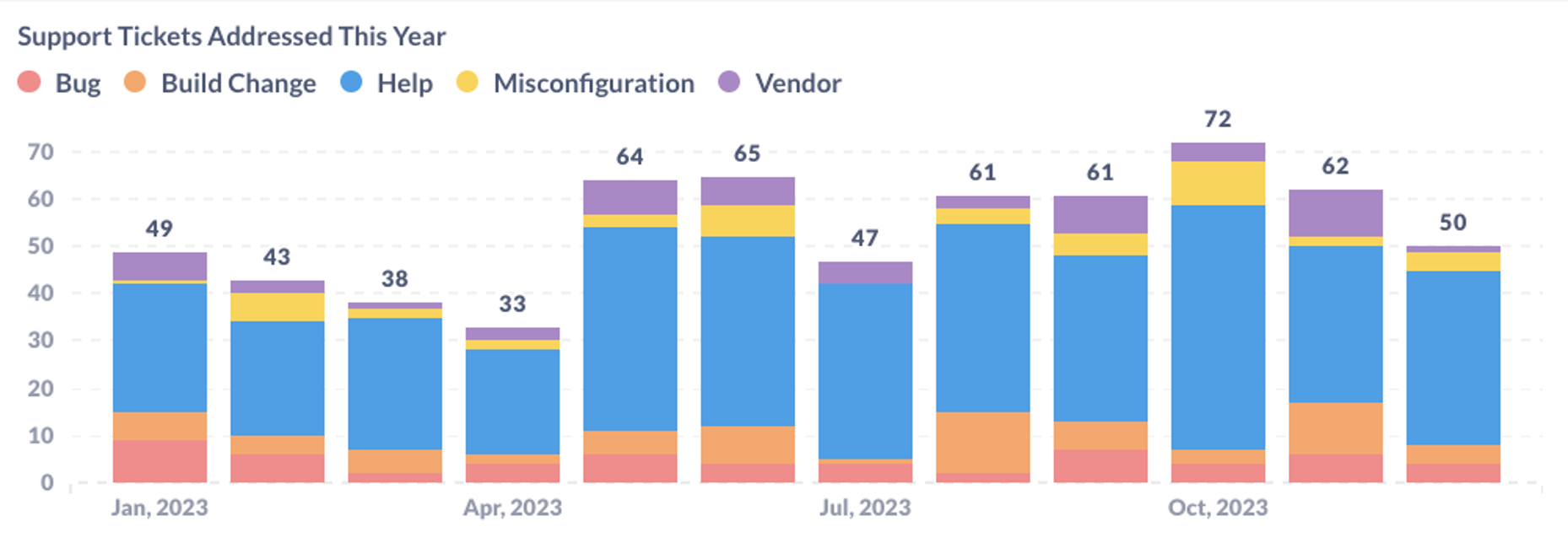Way to Health 2023 year in review

Way to Health (W2H) accomplished a lot in 2023! Though far from comprehensive, this quick recap offers a window into who we are and the work we do.
The team
As anyone in the software industry knows, software is ultimately about the people working on it. W2H has a great culture – almost like a startup within the broader Penn Medicine umbrella. You can look at our prior posts to get an idea of the team dynamic.
We’re a small team of 12, but we get amazing things done, such as launching close to one project a week. None of that would be possible without our friends and partners, who support us both professionally and personally.
Image at right: The Way to Health team, friends, and partners

Continued growth at Penn and beyond
In 2023, the W2H team supported 65 existing programs and launched 49 new clinical and research implementations at Penn Medicine and other health systems – increases of 23 and 18 percent over our respective 2022 numbers. These programs have resulted in 99 peer-reviewed publications to date, with many more in the pipeline.
We are privileged to have been part of close to 1.8 million individuals’ lives, and our numbers are growing quickly – we touched an additional 235,000 lives (a 16 percent increase) in 2023.
Program highlights
We have a large portfolio of 175 active projects that we help design, build, test, iterate on, and support. Research programs run anywhere from six months to six years and are often challenging to support: Rolling out product features could impact the programs, so careful testing and close collaboration with the study teams are needed to make sure the collected data are unaffected. We continually evaluate each of our clinical programs to ensure they are generating ongoing value and engagement among clinicians and patients. Programs that cannot show tangible value are often terminated to protect the time and resources of staff and participants alike.

Key programs continue to scale and deliver value.
- Refill Express is now standard at all pharmacy locations for Penn, with over 7,000 patients enrolled. It enables the rapid rollout of new drug programs: Whereas it would have taken a year plus additional resources to roll out the semaglutide program using traditional telephone outreach, thanks to Refill Express it was rolled out at scale in 90 days.
- Heart Safe Motherhood, a remote monitoring intervention for postpartum hypertension, continues to save lives and reduce the cost of care – and lowers adverse patient outcomes even after the program is completed – at Penn and other institutions across the country. One enrolled patient recently shared these words of gratitude: “I am a mother, and I just wanted to say thank you. This program saved my life. If I can do anything to help or volunteer it would mean the world to me and my family.”
- THEA (Take Home Electronic Assessment) expands on the concept of remote blood pressure monitoring. All expecting mothers receiving care at Penn Medicine are enrolled into THEA, which provides automatic monitoring and education for most patients and allows clinical staff to focus their attention on the specific patient population (about 6 percent) that needs additional help.
Other new programs continue to chart out the new normal at a time when health systems are struggling with rising costs, talent turnover, and other crises. For example, we built a custom records collection application that reduced the time to collect patient consent from several days to less than a minute.
We also support several efforts in the population health management space:
- The colorectal cancer screening portfolio leverages behavioral science, centralized outreach, and automation to systematically enhance show rates and yield earlier cancer diagnoses. This program improved value-based care adherence and increased the screening rate by more than 6 percent.
- The breast cancer screening program increased the screening rate by more than 6 percent and led to early detection in more than 53 cases.
- The flu vaccination program increased the rate of vaccination during primary care visits by more than 8 percent.
Product highlights

The engineering team has continued to be amazingly productive, especially since we shifted to using the Shape Up methodology after exploring various approaches. The team cranked out 148 core feature tickets (roughly three a week) while also addressing bugs (with care to avoid disrupting research and clinical programs, as pointed out earlier), one-off data, and other requests.
Notably, we are now live on Epic’s Vendor Services, meaning that anyone who uses Epic will be able to leverage the programs that we have shown to work and are backed by rigorous academic evidence. We are also integrating more closely with tools like Salesforce and Five9 to provide the enterprise with a singular view of all patient communications.
As we scale and take on more programs, we have the responsibility to provide the necessary support and maintenance. Our operations and engineering team were amazing as usual, addressing a total of 645 tickets in 2023, averaging about 13 tickets a week. Most of the tickets were asking for help around how to use specific features or addressing configuration changes.
Summary
It’s been a challenging yet very rewarding year. We are grateful for all the researchers, clinicians, project managers, research coordinators, IS/IT personnel, and others that we work with both at Penn and at other institutions. Thank you for making 2023 a great year for us.
 About the author
About the author
Mohan Balachandran is the Chief Operating Officer at Way to Health.